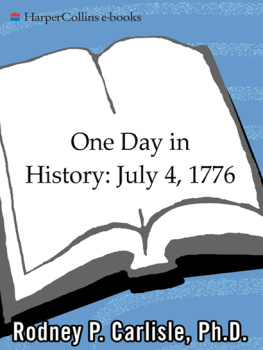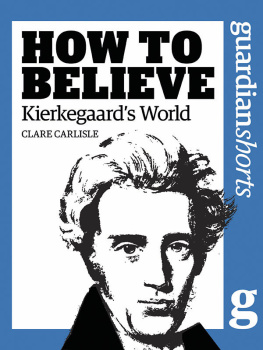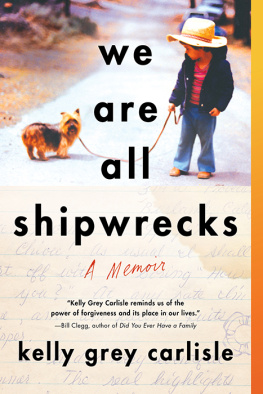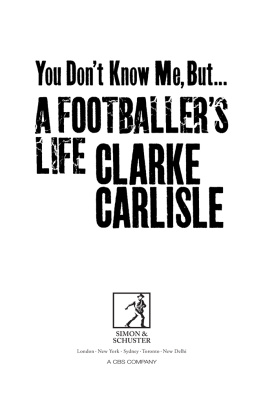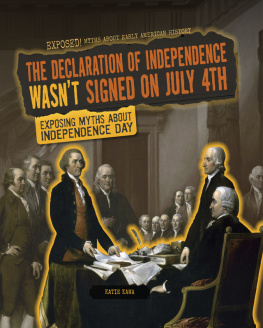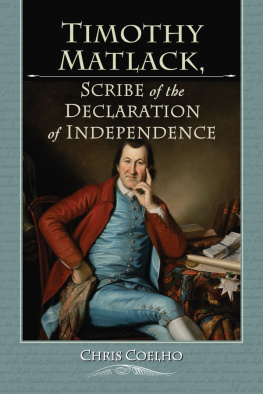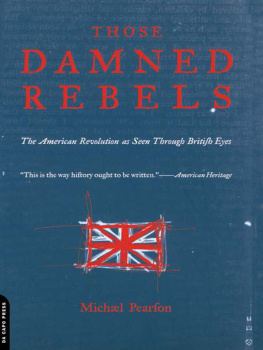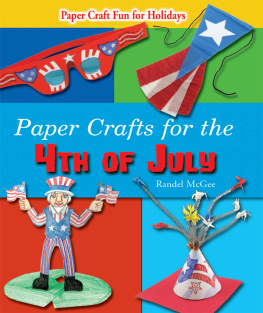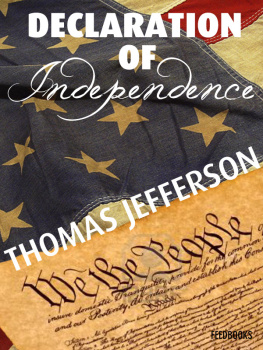Rodney P. Carlisle, Ph.D., General Editor
J ULY 4, 1776, is the most important day in American history, and because of the emergence of the United States as the most powerful nation the world has ever known, it is surely one of the most important days in world history as well. July 4, 1776, is important because that was the day the Continental Congress formally adopted the Declaration of Independence, which announced that the American colonies had severed their ties to the empire of Great Britain. Independence itself had been approved on July 2, and the actual signing of the Declaration took place more than a month later. Yet Americans, as they created their nation, had created an iconic date that would resonate through history.
July 4, 1776, became the countrys birthday, for the Declaration approved on that day legally created the United States of America. The Declaration told a candid world that these united Colonies are, and of Right ought to be Free and Independent StatesAbsolved from all Allegiance to the British Crown. But the Declaration went further than just announcing that the American people were assuming among the Powers of the earth, the separate and equal station to which the Laws of Nature and Natures God entitle them. It went on to state that all governments everywhere were supposed to derive their just powers from the consent of the people, and when any one of these governments became destructive of the peoples rights and liberties, the people had the right to alter or abolish that government and institute a new one.
These words have served as inspiration for peoples everywhere. Colonial rebellions against imperial regimes throughout the world have looked to the Declaration to justify their cause. In declaring Vietnam independent from France in 1945 Ho Chi Minh cited the American Declaration of Independence. Members of Solidarity in Poland and dissidents in Czechoslovakia invoked its words to oppose Soviet domination in the 1980s. And the Chinese students who occupied Tiananmen Square in 1989 used its language. The Declaration of Independence has become one of the most influential documents in world history.
But for Americans the Declaration has taken on a special significance. It infused into the culture most of what the American people came to believe and value. The noblest ideals and highest aspirations of Americanstheir belief in liberty, equality, and individual rights, including the right of every person to pursue happinesscame out of the Declaration of Independence. Consequently, it is not surprising that every reform movement in American historyfrom the abolitionists of the 1830s, to the feminists at Seneca Falls in 1848, to the civil rights advocates of the 1960sinvoked the words and ideals of the Declaration. It was Abraham Lincoln who made the most of the Declaration, particularly its assertions of human equality and inalienable rights. Thomas Jefferson, the principal drafter of the Declaration, said Lincoln, had the coolness, forecast, and capacity to introduce into a merely revolutionary document, an abstract truth, applicable to all men and all times, and so to embalm it there, that today, and in all coming days, it shall be a rebuke and stumbling block to the very harbingers of reappearing tyranny and oppression. A century later on the steps of the Lincoln Memorial Martin Luther King, Jr., took inspiration from this abstract truth embodied in the Declaration.
For Americans the words of the Declaration have become central to their sense of nationhood. Because the United States is composed of so many immigrants and so many different races and ethnicities, it could never assume its identity as a matter of course. The nation has had to be invented. At the end of the Declaration the members of the Continental Congress could only mutually pledge to each other our Lives, our Fortunes, and our sacred Honor. There was nothing else but themselves that they could dedicate themselves tono patria, no fatherland, no nation as yet. In comparison with the 230yearold United States, many states in the world today are new, some of them created within the fairly recent past. Yet many of these states, new as they may be, are undergirded by peoples who had a preexisting sense of their ethnicity, their bloodconnections, their nationality. In the case of the United States the process was reversed: Americans were a state before they were a nation, and much of American history has been an effort to define that nationality. In fact, even today America may not be a nation in any traditional meaning of the term. Americans have had to rely on ideas and ideals in order to hold themselves together and think of themselves as a single people. And the Declaration has embodied these ideas and ideals more fully than any other single document in American history. No wonder the Declaration has been transformed into Americas most sacred text. And no wonder that July 4, 1776, the day that gave birth to the Declaration, is the most important day in American history.
A S THE DELEGATES FILED into the State House on Thursday, some rankled at the fact that the windows remained closed. It was going to be another hot July day in Philadelphia, and some fresh air would be a help. Even with the redolent odor of horse manure and the more distant hints from the fish market, some outside air would be welcome. But the decision had been made to keep the windows closed so word of the deliberations would not be overheard by passersby on Chestnut Street.
Furthermore, tempers were flaring. Despite entreaties from others, the New York delegation continued to balk. They had no instructions from the state and could vote against the resolution. Furthermore, it looked as if the two delegates from Delaware were deadlocked. Unless Caesar Rodney got in to town in time for the vote, July 4, 1776, promised to be just another day of delay and political wrangling.
Finally, Rodney arrived, his horse in a lather and with mud on his breeches and coat. The New York delegates did not vote against the resolution, but chose to abstain. Then there was a discussion of who should sign the document, and only John Hancock, president of the Continental Congress and Charles Thompson, secretary, put their names on the document. Copies were sent by couriers to the states and commanders in the field.
On Monday, July 8, the declaration was publicly proclaimed from the balcony of the State House, known thereafter as Independence Hall. Only later, in August 1776, some of the delegates to the Congress signed the Declaration, and through November others signed, for a total of 56 signatures, including one member who had not been present for the original vote. Thereafter, July 4 celebrations always had a bit of irony because they did not honor the date of the crucial vote. The day marked an agreement on a final version of a document approved two days earlier and signed several weeks and months later. However, John Adams had it almost right when he wrote to Abigail on July 3: The Second Day of July 1776, will be the most memorable Epocha, in the History of AmericaI am apt to believe that it will be celebrated, by succeeding Generations, as the great anniversary Festival.

